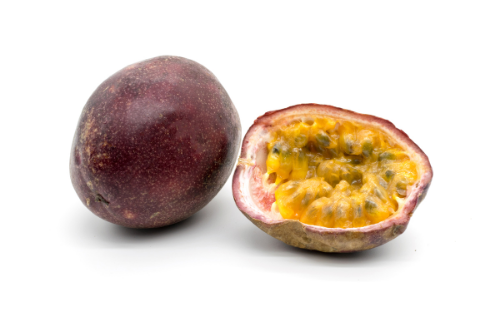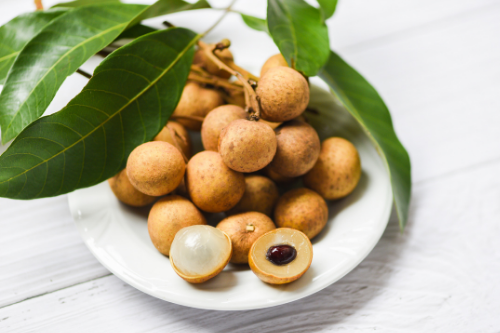Passion Fruit

The family passiflora is home to several delicious fruits, including the passion fruit, granadilla, maracuja, and curuba. These fruits are all known for their distinct tropical flavor and their many health benefits.
Passiflora plants are typically climbing plants, and they can be easily recognized by their beautiful purple flowers that open up to reveal their intricate inner workings. The flowers themselves are often used for medicinal purposes, and they have been known to help with everything from anxiety to high blood pressure.
As for the fruit, it is packed with vitamins and antioxidants that are essential for maintaining good health. In fact, just one serving of this fruit can provide as much as 27% of your daily requirement of vitamin C. This makes it an excellent choice for those looking to boost their immune system and protect their body from harmful free radicals and diseases.
Health benefits passion fruits
Good for digestive health
Passion fruits are incredibly nutritious. Not only are they rich in fiber, but they are also a great source of vitamins and minerals. One of the key benefits of fiber is its role in promoting proper digestion and bowel movements. When you consume enough fiber, your intestines are better able to extract nutrients from your food, and this can help to keep your body healthy in many ways.
Additionally, fiber is essential for maintaining regularity and preventing constipation. So, if you want to enjoy all the benefits of a healthy diet, be sure to include plenty of fiber-rich foods like passion fruits in your daily routine.
Rich in antioxidants
The passion fruit, also known as the maracuya, is a tropical fruit that is packed with numerous health benefits. One of the most significant benefits of consuming passion fruit is its high concentration of antioxidants. These powerful substances help clear free radicals in the body, which can cause damage to cells and tissues.
In addition, passion fruit is also a great source of vitamin C, vitamin A, and dietary fiber, which are all essential nutrients that support overall health. Vitamin C, for instance, helps boost the immune system and improves skin health, while vitamin A is important for maintaining good vision and promoting healthy skin.

Beneficial for your eyes
Passion fruit is an excellent source of vitamin A, which is essential for maintaining good eye health. In addition to protecting the eyes from various eye conditions, vitamin A also helps in the formation of healthy skin and other tissues in the body.
Furthermore, passion fruit is also a rich source of antioxidants, which play a vital role in fighting against harmful free radicals that can damage cells and lead to various health problems.
Boosts immune system
Passion fruit is a highly nutritious tropical fruit that is packed with a variety of health benefits. In addition to being high in vitamin C, passion fruit is also rich in dietary fiber, which can help promote digestive health and reduce the risk of certain diseases.
Vitamin C, which is found in abundance in passion fruit, is a powerful antioxidant that can help protect our bodies from harmful free radicals. Free radicals can cause damage to our cells and contribute to the development of chronic diseases such as cancer and heart disease.
Helps with your heart
Passion fruit is a tropical fruit that is not only delicious but also packed with nutrients that are beneficial for your health. One of these nutrients is potassium, which is essential for a healthy heart.
Another great thing about passion fruit is that it is a good source of dietary fiber, especially if you eat it with the seeds. Fiber is important for maintaining a healthy digestive system and can also help to reduce cholesterol levels in the blood. By removing excess cholesterol from blood vessels, fiber helps to prevent the buildup of plaque, which can lead to heart disease.
Other health benefits
Related blogs
This blog post on health benefits is written from the writer’s personal view and research. We have no medical background. For medical advice, we consult you to contact your doctor (or a specialist or expert). Read our full diclaimer here.







